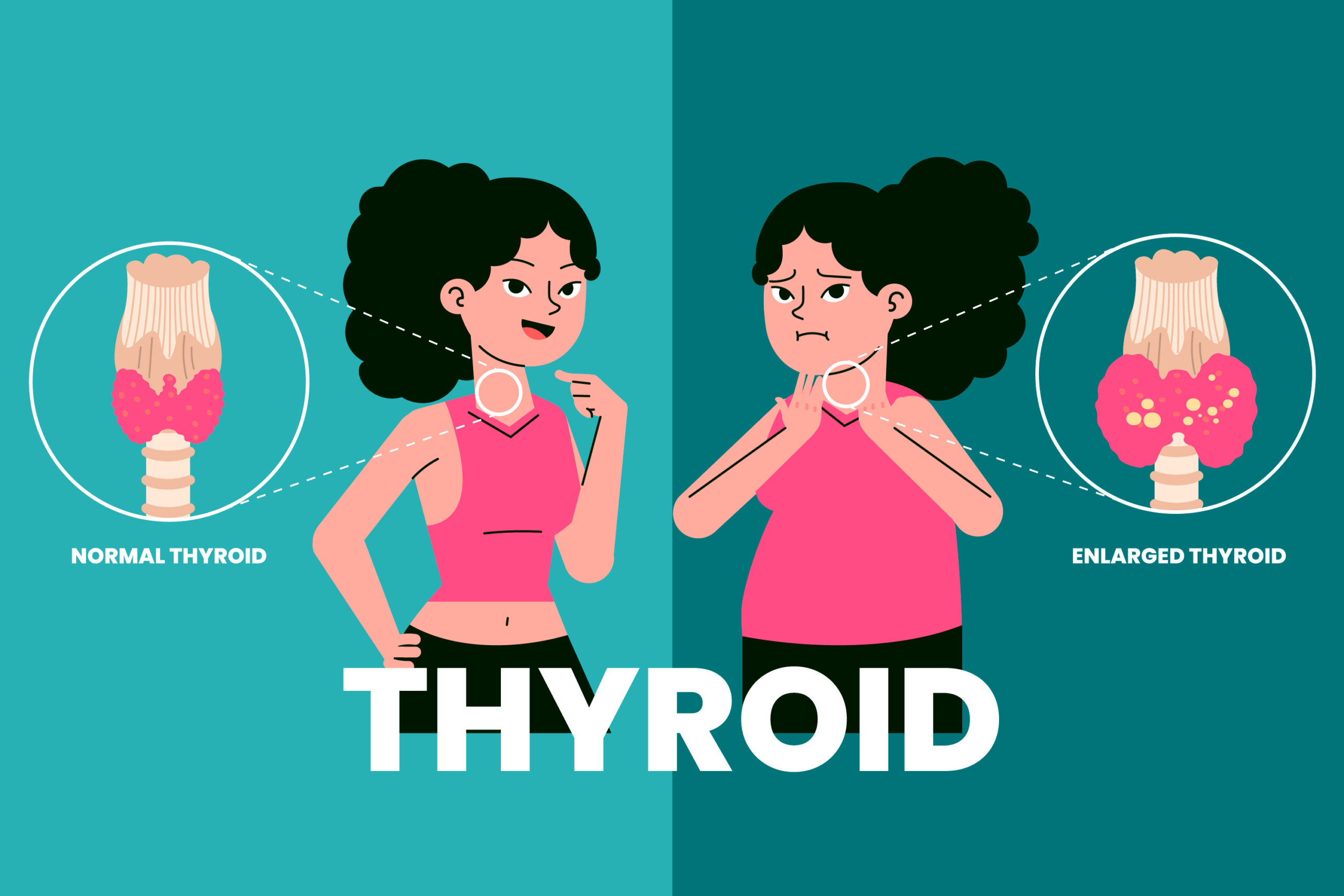Best Diet for Thyroid Function and Weight Control

The Thyroid: Essential for Regulating Various Bodily Functions
In this article, we will explore the best diet for thyroid function and weight control. Because it is not a straightforward topic, firstly we will explain thyroid function and thyroid issues in more detail.
The thyroid is crucial for regulating numerous processes in the body and is involved in nearly all bodily functions. Any changes in its functioning can impact metabolism. The thyroid produces thyroid hormones, which are vital for activating many mechanisms in the body, including weight management. If the nutrient supply to the thyroid is insufficient or if there is pre-existing inflammation, there may be inadequate synthesis of thyroid hormones. Therefore, it’s essential to evaluate each case individually and seek nutritional guidance from a nutritionist or dietitian. This will help tailor a diet that supports thyroid function and promotes overall health, including healthy weight management.
What is the Thyroid?
The thyroid is a gland located at the base of the neck. It is stimulated by TSH (Thyroid-Stimulating Hormone), which promotes the production of two other hormones essential for metabolism: Thyroxine (T4) and Triiodothyronine (T3). T4 is produced in larger quantities but is less metabolically active, whereas T3 is the more active form, though produced in smaller amounts. However, T4 can be converted into T3 in the body, which is crucial for maintaining proper and balanced metabolic function, as a deficiency in one can compromise the production of the other, affecting the body’s functioning and lowering the quality of life.
In situations of inflammation, such as obesity, there can be hormonal dysregulation and alterations in bodily functions. The thyroid contributes to regulating metabolism and energy balance, which can influence appetite and body weight. Additionally, keeping the thyroid healthy helps regulate basal metabolic rate, promotes thermogenesis, and minimises body fat accumulation. Therefore, there is a direct relationship between obesity and thyroid function, as weight gain, an inflammatory process, can disrupt the production and action of thyroid hormones.
Since the thyroid produces hormones that impact overall health and well-being, it is important to assess whether these hormone levels are appropriate before starting a weight loss programme. Overproduction or deficiency of these hormones can result in hyperthyroidism or hypothyroidism, respectively. These conditions can cause problems in the body, which can be minimised with proper nutritional guidance, and planning a diet that healthily stimulates the thyroid.
What Are the Types of Thyroid Problems?

Thyroid issues can arise from imbalances in the production of thyroid hormones (TH) and other pre-existing metabolic changes. TH influence the entire body’s functioning and can affect energy expenditure, as well as other organs like adipose tissue, the brain, liver, and pancreas.
Examples of problems that can occur when there is a thyroid imbalance include:
Hypothyroidism: This condition is associated with reduced TH levels, leading to decreased energy expenditure even at rest, resulting in a slower metabolism. This can lead to weight gain, increased cholesterol levels, and reduced fat breakdown, thereby increasing the risk of cardiovascular disease and Diabetes Mellitus. This condition can also be caused by iodine deficiency in the diet or autoimmune diseases.
Hyperthyroidism: Linked to increased TH production, this condition can raise resting energy expenditure and overstimulate the metabolism. It can be caused by thyroid inflammation, autoimmune diseases, or thyroid nodules. Symptoms may include hyperactivity, weight loss, anxiety, nervousness, tachycardia, and reduced cholesterol levels.
Hashimoto’s Disease: An autoimmune form of hypothyroidism where the immune system attacks the thyroid, potentially leading to the gland’s destruction. Blood tests for thyroid antibodies are necessary for diagnosis. Symptoms may include nervousness, gastrointestinal and cardiovascular issues, mood swings, and chronic fatigue.
Thyroid Nodules: Lumps that can form in the thyroid. These nodules can be benign (non-cancerous) or malignant (cancerous). Typically, there are no symptoms, but they may cause discomfort such as pain, difficulty swallowing, and voice changes. Evaluations might include TSH levels, ultrasound, and biopsy if necessary.
Graves’ Disease: An autoimmune disorder where the immune system attacks the thyroid, causing it to produce excess hormones. This condition leads to hyperthyroidism, and symptoms may resemble those of hyperthyroidism, along with prominent eyes.
Thyroid Cancer: Various types of thyroid cancer can develop in different parts of the gland for numerous reasons, such as overstimulation of thyroid cells. Symptoms may include neck pain, difficulty speaking, breathing, and swallowing. Diagnosis is confirmed through biopsy, imaging tests, and patient-reported symptoms.
Thyroiditis: Inflammation of the thyroid gland, where cases of hyperthyroidism followed by transient or permanent hypothyroidism can occur. As an autoimmune disorder, symptoms are similar to those of hypothyroidism. There are two forms: Subacute Thyroiditis, an inflammatory disease caused by viral infection, and Postpartum Thyroiditis, which occurs within one year after childbirth.
Goitre: This can occur due to iodine deficiency in the diet. As iodine is essential for thyroid function, reduced iodine intake forces the thyroid to compensate, potentially leading to goitre. Symptoms include visible swelling in the neck, which can cause difficulty swallowing or breathing.
Given the various changes that can occur due to thyroid hormone imbalances, it’s crucial to consider the most specific treatment and diet for each case. These changes can have different impacts on health and body weight. It is ideal to seek guidance with a registered dietitian or nutritionist to tailor the best nutritional treatment.
What Are the Best Foods to Eat for Weight Loss with Thyroid Issues?
The nutrients consumed in the diet can affect thyroid development. Certain vitamins and minerals are essential for thyroid gland function and regulation, as well as for weight loss. These nutrients include iodine, selenium, iron, zinc, magnesium, vitamin D, and the B complex.
For these nutrients to be absorbed in the intestine, gut health must be evaluated, as an imbalance in gut bacteria can lead to nutrient deficiencies. Thus, consuming fewer foods rich in the vitamins and minerals mentioned above may increase the likelihood of thyroid issues and weight gain.
The best foods for supporting thyroid health and weight loss include nuts and seeds, eggs, fish and seafood, lean protein sources, mushrooms, berries, and dark green vegetables. It’s important to combine diet with a healthy lifestyle to manage stress and achieve better quality of life.
The Most Beneficial Diets for Thyroid Health and Weight Loss
The effects of diet on weight loss and thyroid health depend on each individual’s metabolism, so each diet needs to be personalised, balanced, and tailored to individual needs.
Certain diets can positively impact weight loss and support thyroid function. These nutritional strategies aim to reduce inflammation by providing foods with antioxidant properties. Additionally, low glycemic index (GI) diets tend to help with weight control by promoting satiety and supporting thyroid function. The low GI diet provide foods that release glucose slowly into the bloodstream due to their lower simple carbohydrate content.
MEDITERRANEAN AND PLANT-BASED DIET
Mediterranean and Plant-Based Diets can be beneficial for thyroid health and weight loss. Consuming fruits and vegetables protects against the development of metabolic diseases such as diabetes, obesity, cardiovascular diseases, and thyroid disorders. Therefore, these two strategies are effective in promoting weight loss and thyroid health.
CALORIE DEFICIT DIET
Managing caloric intake is one factor that may influence overall metabolism, but thyroid health is complex and requires a tailored approach.
The caloric deficit should also be considered to reduce the inflammatory process associated with weight gain and to support thyroid function. By reducing daily caloric intake, thyroid hormones can be better activated, contributing to a balanced metabolism.
INTERMITTENT FASTING
Intermittent fasting may have metabolic benefits, such as improved glycemic control and lipid profile. However, consult with a healthcare provider before making changes to your diet. This may occur because glucose availability to cells is more balanced and possibly reduced, leading to greater satiety, reduced cancer cell proliferation, and less body fat accumulation.
What to Avoid and Why
Several factors can influence thyroid function, including external environment and lifestyle choices such as diet, physical activity, and social life. It’s essential to understand what choices to make and which foods to avoid to ensure healthy thyroid performance.
GLUTEN and SOY
Some individuals with autoimmune thyroid conditions, like Hashimoto’s, may find it beneficial to limit gluten or soy, but it’s important to consult a healthcare professional before making significant dietary changes.
CRUCIFEROUS VEGETABLES
Cruciferous vegetables, such as broccoli, cauliflower, and kale, may directly affect the thyroid because they contain a nutrient that can inhibit iodine absorption from food. Since iodine is important for thyroid function, it’s crucial to balance cruciferous vegetable consumption with iodine to maintain thyroid health. The exact amount of cruciferous vegetables that might negatively affect the thyroid is still unknown.
CAFFEINE
Caffeine and alcohol can reduce the absorption of vitamins and minerals in the gut. They decreasing the availability of nutrients essential for thyroid function. Additionally, excessive consumption of processed and industrialised foods can promote the development of metabolic diseases in the body such as weight gain, Diabetes Mellitus, and high cholesterol, and can alter thyroid functions. Therefore, reducing the intake of these foods is necessary to ensure quality of life and health.
It is important to mention that the foods mentioned above should be eaten in small quantities or not so regularly. It doesn’t mean that you can’t consume them, it is advisable to speak to a nutritionist to understand the frequency and quantity recommended for each individual.
What is the takeaway message?
Since thyroid function is highly individual, any diet or weight management approach must be tailored to the person. Everyone has specific needs that must be carefully considered to maintain hormonal balance and overall well-being. That’s why it’s crucial to consult with a nutritionist to develop a suitable eating plan that meets your unique needs, supports thyroid health, and helps you achieve effective and lasting results.
The tips in this article are meant to be for information and should not rule out any recommendations from your doctors or it is not intended to treat thyroid.
Get an action plan with a Free Assessment!
Get personalized insights to enhance your well-being and achieve your goals. In this 15-minute video call, we will listen to you and guide you on what you need to do.
Schedule Your Free AssessmentRecent blogs







